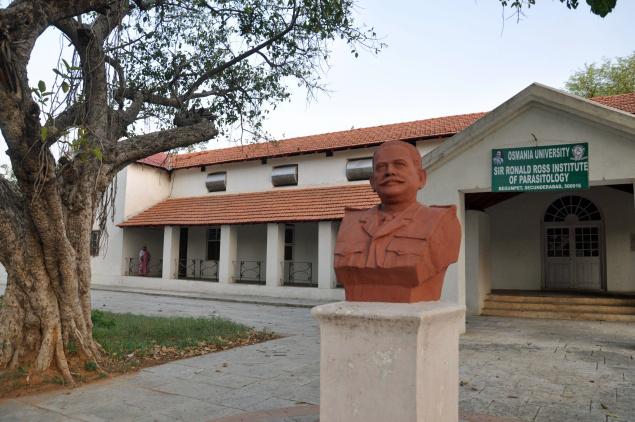
He discovered the malarial parasite in the intestines of female mosquito at the fag end of his stint as medical officer on these premises
The pride of being home to the discovery of malarial parasite is not something that any city would let pass without a care. The site of such historic discovery in Hyderabad, however, lies tucked away in a remote corner of Begumpet, unnoticed by many, and unused for more than six years.
The Sir Ronald Ross Institute of Parasitology, a heritage building, is under lock and key for most of the time, not open even for the visitors who might be interested in catching a few glimpses of the photo museum inside.
Nobel laureate Ronald Ross discovered the presence of malarial parasite in the intestines of female anopheles mosquito at the fag end of his stint as medical officer on these premises between 1895 and 1897, when it was a hospital for the British regimental troops. Copy of a journal entry by Mr. Ross about the discovery dated August 20 can be found in the museum, as also his drawings of the parasite.
The building later served as an “officers mess” for British regiment, and was under Deccan Airlines for a brief while. Later after accession of Hyderabad State, it was handed over to the Osmania Medical College for further research on Malaria.
However, later, the 2.5-acre premises were handed over to the Airport Authority of India (then National Airports Authority) for development of the peripheral areas of the Begumpet Airport. In 1975, with initiative from the OU Zoology department, the structure was handed over to the Osmania University, while the land remains with the AAI. After being identified as heritage structure, renovation of the building was carried out in 2010-12 with Rs.45 lakh, which has brought back the lost aura to it. However, since then, the premises remain unoccupied, with whatever research in the institute’s name, having been shifted out into the OU premises.
“Land ownership by the AAI remains a road block for any effort to develop it as a pioneering research centre for vector-borne diseases. There is no approach road to the premises. Though Rs.6.5 crore was sanctioned earlier by the Archaeological Survey of India for approach road, we could not use it as AAI denied permission,” Director of the institute B.Reddya Naik informed.
Besides, water supply too was disconnected recently by the AAI to curb illegal water tapping, which rendered the premises even more unusable. Correspondence since 1997 with the Civil Aviation Ministry for transfer of land has not yielded results.
source: http://www.thehindu.com / The Hindu / Home> News> Cities> Hyderabad / by Swathi Vadlamudi / Hyderabad – August 21st, 2016